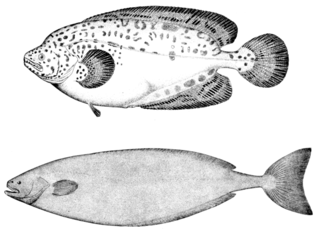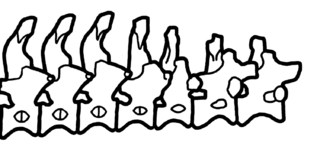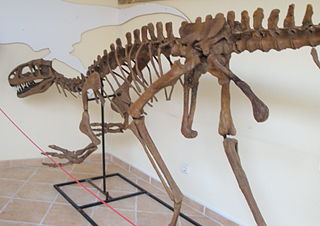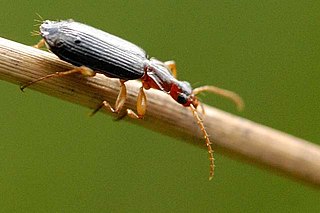
The ragfish is a ray-finned fish of the northern Pacific Ocean; although a perciform, its skeleton is mostly cartilage, and the larvae have pelvic fins that disappear as they mature. It is the sole member of the family Icosteidae, and some authorities place it into its own order Icosteiformes.

Dinheirosaurus is a genus of diplodocid sauropod dinosaur that is known from fossils uncovered in modern-day Portugal. It may represent a species of Supersaurus. The only species is Dinheirosaurus lourinhanensis, first described by José Bonaparte and Octávio Mateus in 1999 for vertebrae and some other material from the Lourinhã Formation. Although the precise age of the formation is not known, it can be dated around the early Tithonian of the Late Jurassic.
Dyslocosaurus is the name given in 1992 to a genus of sauropod dinosaur from the Late Jurassic Period of Wyoming, North America.

Lusotitan is a genus of herbivorous brachiosaurid sauropod dinosaur from the Late Jurassic Period of Portugal.

Lourinhanosaurus was a genus of carnivorous theropod dinosaur that lived during the Late Jurassic Period (Kimmeridgian/Tithonian) in Portugal. It is one of many large predators discovered at the Lourinhã Formation and probably competed with coeval Torvosaurus gurneyi, Allosaurus europaeus, and Ceratosaurus.

Dromius is a genus of ground beetle native to the Palearctic, the Nearctic, the Near East, and North Africa. It contains the following species:

Microlestes is a genus of ground beetle native to the Afro-tropical region, the Palearctic, the Near East, North Africa, and the Oriental region. It contains the following species:
Clavus aenigmaticus is a species of sea snail, a marine gastropod mollusk in the family Drilliidae.
Polpochila is a genus of beetles in the family Carabidae, containing the following species:

Lebiinae is a subfamily of beetles in the family Carabidae.
Trymosternus is a genus of beetles in the family Carabidae, containing the following species:

Promecognathinae is a subfamily of beetles in the family Carabidae. It contains 10 species in 7 genera:

Trechinae is a subfamily in the ground beetle family, Carabidae.
Aenigmaticus may refer to the following species:

Galeamopus is a genus of herbivorous diplodocid sauropod dinosaurs. It contains two known species: Galeamopus hayi, known from the Late Jurassic lower Morrison Formation of Wyoming, United States, and Galeamopus pabsti, known from the Late Jurassic fossils from Wyoming and Colorado. The type species is known from one of the most well preserved diplodocid fossils, a nearly complete skeleton with associated skull.
Pseudomaro is a monotypic genus of sheet weavers containing the single species, Pseudomaro aenigmaticus. It was first described by J. Denis in 1966, and has only been found in Europe.

Lebiini is a tribe of ground beetles in the family Carabidae. There are at least 190 described species in Lebiini.
Microlestes curtipennis is a species of ground beetle in the family Carabidae. It is found in North America.
Theroteinus is an extinct genus of haramiyidan mammaliaforms from the Late Triassic of France and Britain. It contains three species: T. nikolai,T. rosieriensis and T. jenkinsi, the former two of which are known exclusively from teeth found at the sand quarry of Saint-Nicolas-de-Port, while T. jenkinsi is known from a bedded sequence belonging to the Westbury Formation in a road cutting near Holwell, Dorset. Theroteinus is the only member of the family Theroteinidae and the suborder Theroteinida.

Navanax aenigmaticus common name the mysterious aglaja is a species of Navanax found in the Pacific Coast of Central America.











